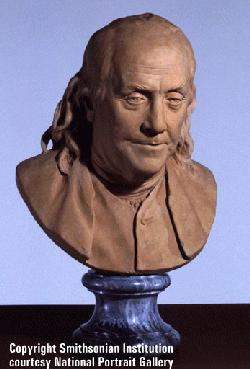1 -
Three Stages in Human Evolution
2 - Stone Age Humans
3 - Greece & Rome
4 - The 17th and 18th Centuries
5 - The Social Reforms of the 19th and 20 Centuries
6 - 1950 to 2000 - The Coming Gerontocracy
7 - The Problem
8 -The
Solution |
 Ben Franklin
Ben Franklin
|
In the time of Shakespeare (1500s), the average
life-expectancy of the aristocracy was about 29 years. Undoubtedly, that
of the commoners was much less. One hundred years later in the time of Hobbes
(1600s), the average life-expectancy of the aristocrats increased to about
33 years. Another one hundred years later, in the time of Benjamin Franklin,
it rose to about 35. Infant and adolescent mortality remained high and only
a few reached advanced age.
Franklin, who lived to age 84 and who existed
at the beginning of the technological era, could see where things were headed.
In his letter of 1780 to Joseph Priestley (who was to discovered oxygen),
he wrote the following prediction.
"I always rejoice to hear of your being still employ'd in Experimental
Researches into Nature, and of the Success you meet with. The
rapid Progress true Science now makes, occasions my Regretting sometimes
that I was born so soon. It is impossible to imagine the Height to which
may be carried in a 1000 Years the Power of Man over Matter. We may perhaps
learn to deprive large Masses of their Gravity & give them absolute
Levity, for the sake of easy Transport. Agriculture may diminish its Labour
& double its Produce. All Diseases may by sure means be prevented or
cured, not excepting even that of Old Age, and our Lives lengthened at pleasure
even beyond the antediluvian Standard. O that moral Science were in as fair
a Way of Improvement, that Men would cease to be Wolves to one another,
and the human Beings would at length learn what they now improperly call
Humanity."- Reference. Oberg, B (Editor) The Papers
of Benjamin Franklin, Vol 31, page 455-456, Yale Univ. Press 1995. |